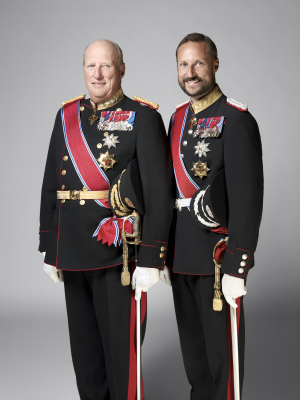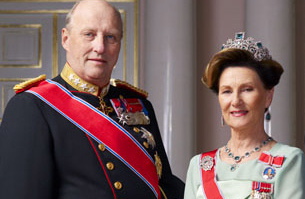NEWS ANALYSIS: Norway’s Parliament (Stortinget) has predictably cast aside the latest effort to convert the country from a constitutional monarchy to a republic. The proposal voted on earlier this week, however, raised some new questions about Norwegian democracy, and signaled some new support for the republican movement.

Until now, it’s mostly just been the now-small Socialist Left party (SV) that routinely fronts proposals to turn Norway into a republic and replace the monarch, currently King Harald V, with a president. This week SV was joined by four members of the Labour Party (Arbeiderpartiet, Ap), who didn’t outright propose toppling the king but rather preparing a report (called an utredning in Norwegian) on how a republic with a president would function.
The parliament, as political commentator Hege Ulstein noted in newspaper Dagsavisen on Wednesday, is normally keen to prepare such reports (often moreso than to actually take any firm action on any given issue). But in this case a majority characterized as “overwhelming” by news bureau NTB voted to crush the Labour MPs’ proposal. Only 11 MPs voted in favour of studying a conversion to a republic, while 83 voted against. “If it ain’t broke, don’t fix it,” said one MP from the conservative Progress Party (Fremskrittspartiet), in English.
Ulstein wrote that as many as 40 percent of the MPs in parliament are republican sympathizers but their party platforms all support the monarchy (except SV’s). They remain loyal, and the monarchy consistently survives attempts to phase it out despite the inherent paradox of its existence in a social welfare state like Norway. Norwegian politics promote egalitarianism and otherwise generally condemn what some call the “anachronistic” aspects of royalty, like wealth, privilege of birth and inheritance of power. The royals can also effectively be above the law, as seen in recent years when royal family members are exempted from zoning laws or even speed limits, such as the time the late King Olav pardoned his son, then-Crown Prince Harald, after he’d been caught driving too fast.
Even ardent Labour Party members like Martin Kolberg, though, were actively campaigning against the proposal of his own party colleagues on Monday, and that’s where commentators like Ulstein saw another paradox. Kolberg claimed that preparing a report on a republic would “destabilize our democratic understanding.” He refused to elaborate, even when asked what he meant by that. Ulstein noted in her column in Dagsavisen that all earlier proposals on replacing the monarchy with a republic have been rejected on the grounds because no utredning (report) has been prepared. “That the same MPs who have believed that now vote against an utredning is quite fantastic,” Ulstein wrote. The bottom line as she sees it: “We can’t change to a republic because it hasn’t been studied. And we can’t study it because that would destabilize our democratic understanding.”

Another democratic problem with the monarchy also emerged during this week’s short debate in Parliament. MPs generally stress that Norway’s constitutional monarchy was approved by a referendum in 1905, in which it’s widely said to have won “massive” support among Norwegians. At that time, though, only half the population was eligible to vote (women, for example, were still banned at the ballot box). Not all of the eligible voters actually voted, and 79 percent of those who did approved only the actual wording on the referendum, that Norway’s government be allowed to “encourage” then-Prince Carl of Denmark to become Norway’s own king (he did, becoming King Haakon VII, grandfather of the current King Harald V).
That means, according to Ulstein, that only 29.6 percent of Norway’s adult population actively supported a monarchy for Norway more than 100 years ago. “Not bad, but not exactly a resounding, enthusiastic mandate of the people,” Ulstein wrote.
Norway’s modern-day politicians are also often quick to point out that the country’s monarchy is mostly ceremonial, and that the monarch has no formal political power. Norway’s kings (and queens) have shown that they do have power, though, because they can highlight issues and set an agenda, they’re listened to and the monarch meets with the government every week in the Council of State. The royals’ personal friendships with some top politicians have also set off some concerns, like when the friendship among Crown Prince Haakon, Crown Princess Mette-Marit and former Labour Foreign Minister Jonas Gahr Støre (now Norway’s health minister) became known and the crown couple attended Støre’s private 50th birthday party, or when Haakon’s sister and her husband were seen in the same circles as Labour minister Trond Giske.
Both proponents and critics of the monarchy note how it can unite Norwegians across party lines, and is especially good in time of crisis. Both during World War II, when serious accidents have occurred or, most recently, during the terrorist attacks in 2011, royal family members have provided a strong source of sympathy and support.
All indications are that the monarchy is here to stay in Norway, despite the occasional bursts of criticism and calls from republicans. It remains ironic, according to Ulstein, that “a ‘democratic understanding’ has gotten us to believe that we are bound by the votes of less than 30 percent of the adult population cast more than 100 years ago,” and that even mounting a report on an alternative has been rejected once again.
Views and News from Norway/Nina Berglund
Please support our news service. Readers in Norway can use our donor account. Our international readers can click on our “Donate” button:

